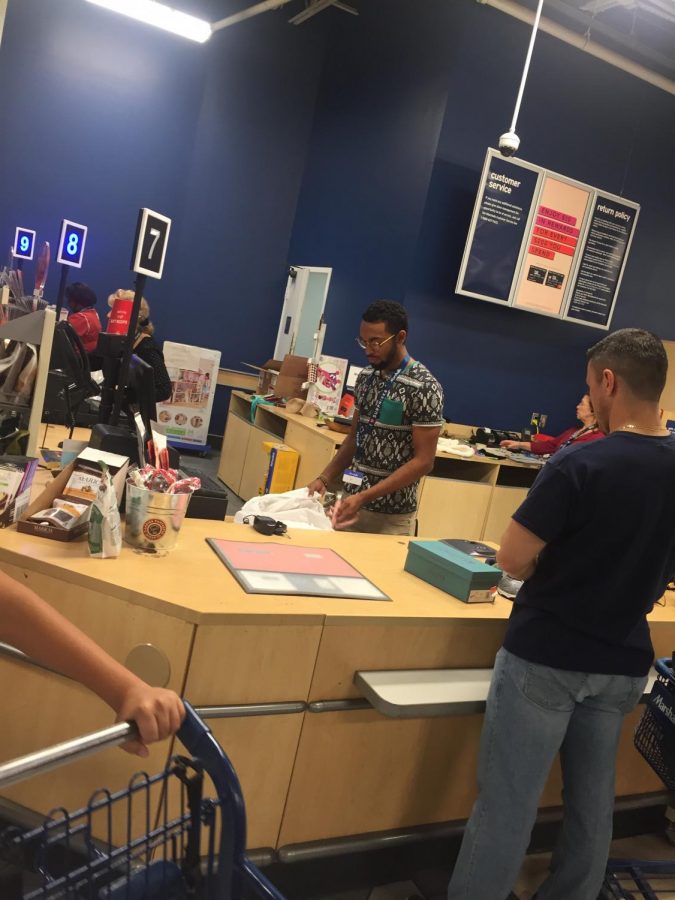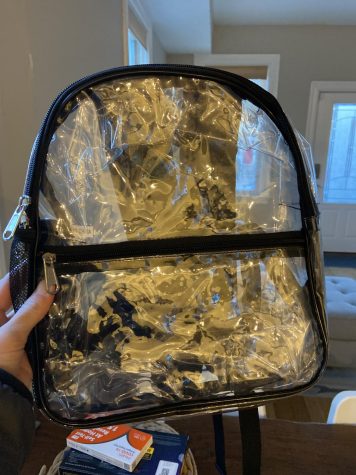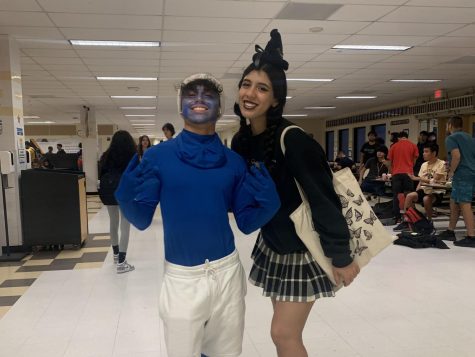After the bell means on the clock
Students balance work and school
The morning after a closing shift, senior Jaiden Moses arrives at school a good 10 minutes after the bell, prior to a long night of studying and finishing his assignments. He has no time to pick out his outfit. By 2:40 p.m., he’s rushing out of school to get ahead of the student parking lot traffic. If not dressed strictly for work (regular jeans and a plain shirt), he will have to drive 25 minutes in the opposite direction to change uniform.
Moses works at Marshalls for an average of 20 hours a week. He says the most challenging aspects of working and going to school are “sleep, closing shift, and managing academics.” His goal is to graduate and save money.
“Sleep is essential. I don’t get a full eight hours of sleep, which can result in me falling asleep in class, not being able to study or [failing to] remember important events,” Moses said.
Moses’s most common shift is closing and usually has him leaving at 10:30 p.m.. When working this tiresome shift, he has to lift boxes, take out trash and be on his feet constantly. He only gets a 15 minute break.
Since last May when Moses was hired, he said his grades are “alright” but lower than when he started working.
Moses said his mother wants academics to be his priority, so she tells him that if he can’t keep good grades, then he can’t keep his job. Moses said he feels like if he can’t work he won’t be independently making money of his own.
“[My mom] tries to use it [working] as a privilege even though it’s a way I support myself,” Moses said.
Despite their differences, Moses said his mom’s “nagging” motivates him to work harder in school and stay on track.
Keeping a busy schedule, junior Atierani Mcintyre works at the Gap at Sawgrass Mills and averages 24 hours every two weeks. She said a difficult part about the work force for her is understanding customers and dealing with their attitudes. She said it’s developing her into an amiable person and building her character to always be professional.
Another challenging part for Mcintyre is communicating with tourists who come to her job to shop. Sawgrass Mills is in one of the most popular tourist attractions in South Florida, where customers often speak languages other than English.
Mcintyre also participates in an early childhood education internship every other day where she goes to Fox Trail Elementary and teaches from 9 a.m. to noon. Mcintyre said her internship gives her the opportunity to pursue her career by being around the kids, teaching them math, phonics and getting use to the environment of teaching by mirroring the teacher and picking up helpful strategies to deal with the kids.
Motivated to finish high school, senior Jamar Ramsawak has worked at Publix for two and a half years and averages 27 hours a week.
“The hardest part about working and going to school is time management,” Ramsawak said.
While he said it was a struggle to balance both responsibilities, to work and get all his homework done and handed in on time, Ramsawak appreciates what he’s learned working at Publix. Working in customer service and as a grocery clerk, he said he’s developed better communication skills. He works four days a week and every weekend. He gets three days off and uses his spare time to hang out with friends and family.
“When I get tired, I sometimes forget to complete my assignments. When I first started working, [my grades] were good, but then I noticed them fluctuate,” Ramsawak said.
Just like Moses, time management is one of Ramsawack’s issues, putting aside enough time to handle his business. He said Publix offers stocks to employees but he started working young mainly because he was anxious for the experience and he wanted to make his own money. Ramsawack said he wants underclassmen and graduates to know they have to do well in school because Publix offers scholarships.
Senior Tony Sakhleh works at Wing Stop for a year. He averages 15 to 20 hours and gets paid biweekly.
“The food industry is cool. I learned a lot of things, [like] communicating is key–our crew has to work as a team to give the best customer service,” Sakhleh said.
As a first job, Sakhleh said it’s a “learning” experience for him, as he has to deal with people and their complaints. Sakhleh said he’s very bad with time management, so trying to sort out work and school is tough. He also carries the famous procrastination trait.
“I force myself to do work because my grades are important. Even if I procrastinate I get things done,” Sakhleh said. The main reason he started working is because he wanted his own money and his parents forced him to look for one.
Senior Sidondrah Hills has worked at Michaels for a month and averages 20 hours a week. She said it can be difficult when she has the closing shift and has to rush home and do work.
“I balance work and school by utilizing my study hall to get all my work finished,” Hills said.
Hills also said she’s gaining independence and patience by working but that it’s also difficult with all these new things going on during her senior year. Hills said she noticed that a few of her grades dropped since she started working. Her teachers have been “so generous” to be flexible with her on how she can do better in school while balancing a job. When Hills works the closing shift, she stays up to midnight to finish all her school work.
Managing both responsibilities of work and school pose challenges, but for teenagers, it’s a part of maturing and gaining independence as they transition to life after school.









